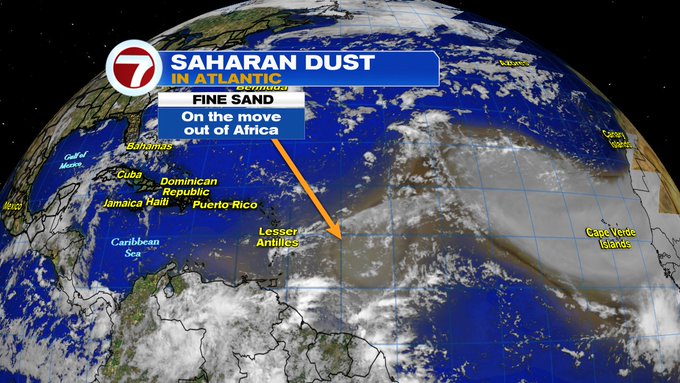You have been hearing a lot about a huge plume of Saharan Dust moving in our direction. The Eastern Caribbean Sea has already seen huge concentrations of this dust impact places like Trinidad & Tobago. This is how their weather center described it.
 |
| Picture courtesy TT Weather Center |
Satellite View
The proper name for this dust is the Saharan Air Layer or SAL for short. If models are correct, the dust should continue moving west impacting the rest of the Lesser Antilles and Puerto Rico by Monday. Pushing though Dominican Republic, Haiti, Jamaica, & Eastern Cuba by Tuesday and then the rest of Cuba the Bahamas and South Florida by Wednesday.
Impacts
The dust should dry out the atmosphere reducing rain chances. We do not expect SAL to be as dense as it has been across the Lesser Antilles but we can still expect:
- Hazy skies
- Drier Days
- Hotter Temps
- Brilliant Sunrise & Sunsets
- Less Tropical Action
- Amazon Jungle Benefits
- Beneficial Iron to the Ocean
- Health Concerns
- One of the best features of SAL, is that it robs moisture from tropical waves and keeps them in check. While they can still whip up winds and develop thunderstorms, they just don't have the fuel to grow stronger.
- The dust will also aid in highlighting the yellows, oranges, and reds during sunrise and again at sunset.
- Sahara-Amazon connection: Per NASA, SAL picks up minerals like phosphorus and carries it to the Amazon providing this rich nutrient to plants. It's something the forrest needs to stay healthy. Its the same kind of fertilizer bought at a store, just healthier for the environment. Some estimates go as high as 22 thousand tons of phosphorous are delivered annually to the Amazon via SAL.
- Vitamins for the Ocean. Any dust that settles onto the ocean surface, provides iron to algae. When the algae sinks, it is then consumed by plankton. Their shells sink to the bottom trapping harmful carbon dioxide. It's Mother Nature's way of keeping our oxygen supply safe.
- Unfortunately, the dust is also an irritant and will be a worry for folks with respiratory issues. Experts are suggesting if you suffer from breathing ailments, to stay home. If you can't, use a mask and nasal rinses. The best is to contact your heath care provider for more info.
Is SAL a new thing?
Not at all, it happens every season. From spring through fall, big storms over the Sahara desert whip up huge clouds of dust. Winds off the African continent push them into the Atlantic Ocean. It normally takes about a week for the dust to make it across the ocean.
This SAL outbreak however is more intense than normal due to stronger storms over Africa.
This SAL outbreak however is more intense than normal due to stronger storms over Africa.
We'll keep you posted.


